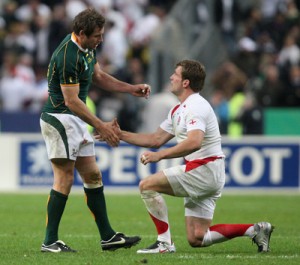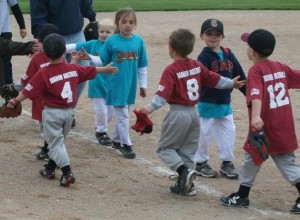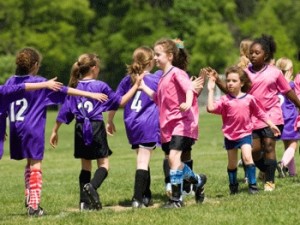Learning to Lose Gracefully – 7 Tips

This morning I read yet another story in the news about a youth sporting championship event gone awry because of poor sportsmanship on the part of the adults (parents and coaches) that transferred down to the youth until the police were called in to diffuse the situation and restore a semblance of order. The article indicated that “the players returned to their homes with no tournament medal but, instead, memories of silly, profane behavior from child athletes to grown-ups alike.”
I can’t help but cringe every time I read such an article. It seems the level of unsportsmanlike conduct and incivility continues to grow all around us in society.
But it doesn’t just manifest itself in sporting events. Think of all the incidents of road rage where frustrations quickly escalate or of political protests that get extremely heated. It can also be manifested in people cheating to get ahead or in dishonest business dealings.

With so many stories of situations such as the sporting event I read about today, we can’t help but ask “where do people learn to act the way they do?” I believe the simple answer is “in the home.”
We strongly believe that civil and virtuous behavior needs to be taught in the home. And while we don’t want to trivialize any of these serious situations of civil unrest, we do believe that something as simple as board games can start children at a young age learning how to lose gracefully.
It all starts in the home.
So how do you teach your children to lose gracefully?
- Have you ever had to duck for cover when a thrown game piece comes hurling at your head?
- Have you ever played “pick up all the games pieces” after a child flings the game board and sends the components flying around the room?
- Have you ever wanted to stuff earplugs deep in your ears to cancel out the noise of your children arguing over a move or turn in a board game?
If so then you’re perfectly familiar with a very human tendency of children to manifest their frustrations by doing some physical form of destruction.
But not everyone shows their frustrations in those manners. Another very human reaction is to well up in tears and/or storm out of the room.
Unfortunately, there isn’t a single, simple solution to this issue. And that’s mostly because no two kids are alike. And just like with everything else we try to teach our children (like math or spelling or washing the dishes), they all learn differently and will have different tendencies.
So like with most aspects of parenting, a lot of your tactics will come from experience. And just because we’re writing this article, doesn’t mean that every game we play goes perfectly without any issues. What we can say is that by using some of these strategies over time we have been able to see our kids better learn how to lose gracefully.
1. Set the Example

The first way to teach them, is by example. Another quote I recently read stands out in my mind. “Teaching virtuous traits begins in the home with parents who care and set the example. A good parental example encourages emulation, while a poor example gives license to the children to disregard the parents’ teachings and even expand the poor example. An adult’s good example is a priceless gift.”
If you’re a poor sport or have a hard time losing, then your attitude will surely show through. So the first way to teach is to live it yourself. And if you have a hard time losing a board game or card game to a young child, then you especially need to change your ways. Give your children the priceless gift of a good example.
2. Joy is in the Journey

Your children are sure to face disappointments along the road of life. And in the life of a toddler or young children those disappointments will come multiple times a day. And a lot of times, the day ends with a disappointment – “you mean I have to go to bed again?” In fact, this lesson about teaching that the joy is in the journey came from an experience with a bedtime routine.
After having a great bedtime story with a 6 year old the lights go out and the protests began and things seemed to go downhill. A simple statement calmed the situation and it has proved to work with games as well. “We’ve just had a great time together. Let’s go to sleep with thoughts of the fun we had.”
It will take repeated reminders, but teaching that the fun is in the activity rather than the outcome will go a long ways in teaching the proper perspective about disappointments.
3. Cool Down
A cool down period will also go a long way in helping settle their minds about losing. However, sometimes when left completely on their own, children may continue to huff and puff and escalate the loss in their minds. So we’ve found that a cool down period is good as long as you give the child something positive to think about during the cool down period – such as thoughts of the fun during the game. Another thing our children have liked to help them cool down is music. Music can do wonders to help set a mood.

4. Winning Gracefully
Equally as important as teaching to lose gracefully is teaching to win gracefully. Nothing can set off tempers quite like a brother or sister gloating in your face. If you’re already mad and someone does a victory dance on your grave, then the volcano is ready to erupt. Good sportsmanship goes both ways and it’s just as important to teach how to be happy for a victory in a game without being a poor sport.
5. Prepare in Advance
Good sportsmanship has a lot to do with being polite. Teaching your kids manners before, during, and after a game will have a big effect on their learning how to win gracefully. So don’t wait for the game to end to talk about winning and losing. It’s good to talk about acceptable game behavior before the game even starts. Helping to set the stage properly can make for a better game experience overall. Let everyone know that you’re playing a game to have an enjoyable time together. Tell them that what you like is spending time with them. So someone will win and others won’t but that’s ok because that’s not what you’re really there for. You just want to see them do their best and you hope they get better each time they play.
6. Practice makes Perfect
Can we really attain perfection? Who knows. But what we do know is that everyone will get better with good practice. One of the great experiments we tried early on came from a parenting talk we heard about practice. The basic premise is that if your child makes a mistake, then they need to try again. So when two siblings are having trouble getting along, they need to practice playing together more.
So if they’re playing a board game together and they start yelling or calling each other names or such, then we help set the stage for them to try again. In doing, we make sure some additional parameters are set for the next round of play – which will depend on the type of game they’re playing. And we’ll also be nearby to help steer things along. It can be a very short, few minute game. But the overall purpose of that practice round is solely for them to exhibit good sportsmanship.
The more opportunities you give your children to practice their good sportsmanship the better they will do in learning how to win and lose gracefully.

7. Praise the Positives
And one of the most important aspects of teaching good behavior is in praising the positives. Don’t overlook this step in the process. Whatever we reinforce will be repeated. At the end of every game you play with your children, take time to talk to them about the experience. You can talk to them about the improvements you see in their reasoning or in their abilities to comprehend the strategy of the game. But one of the most important things to tell them about is how they behaved. Talk about how enjoyable of an experience it was because you were playing with them and how much you appreciate the way they played to make it fun for all.
We wish you the best in raising your children to be happy, healthy, and productive members of society. We know that board games provide a fantastic environment for learning many of life’s important lessons – including how to lose gracefully. That’s why we like to encourage taking advantage of these opportunities with your family.
It takes a lot of work, but it’s so worth the efforts.


An excellent article and 7 points that we should all remember.
I have posted a link to this article on Father Geek.
Really great article! Learning how to lose without ‘losing it’ is still a challenge for my kids.
I sometimes remind them that it’s like learning to skate: If you’re not falling down sometimes, you’re not learning.
Thank you for your tips. I will now try all these tips on my 9 year old daughter, who can’t play a game nicely unless she wins……… wish me luck.